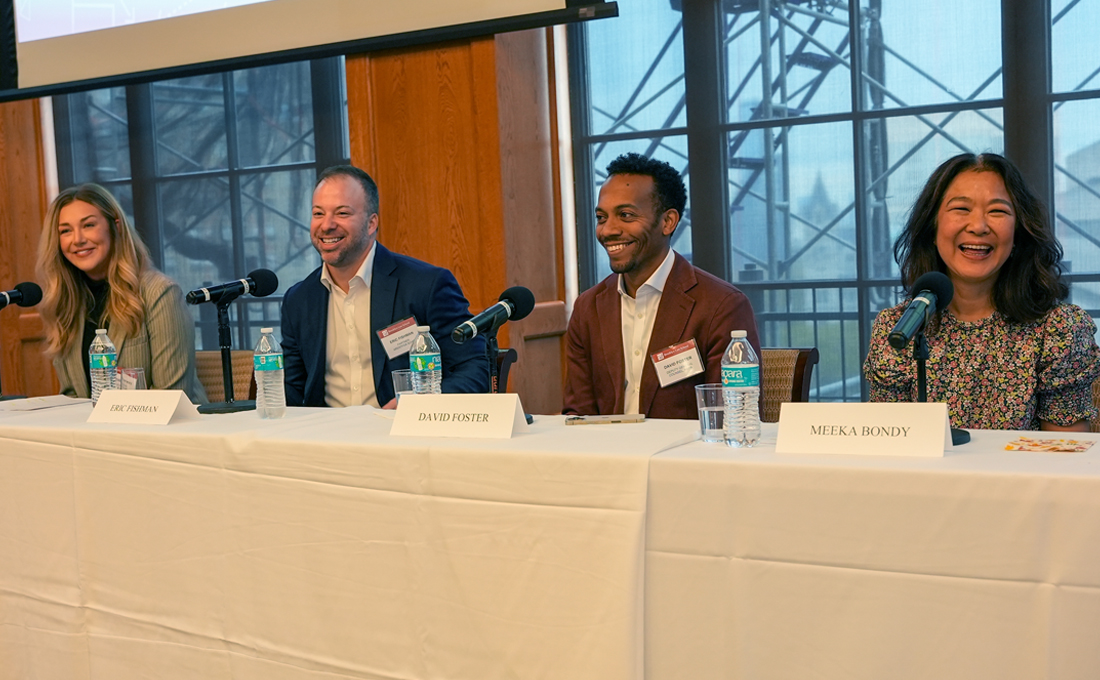Third Annual Sports Law Symposium Tackles Artificial Intelligence and Biometric Data

By Julia Rafferty
The Brooklyn Entertainment and Sports Law Society (BESLS) and the Intellectual Property Law Association (IPLA) held the third annual Sports Law Symposium Oct. 27, bringing together three panels of distinguished experts in sports law, data security, and artificial intelligence.
The sold-out event featured panels on emerging tech and sports law intersections including sessions on “Playing Offense: Optimizing Artificial Intelligence and Athlete Biometric Data,” “The Esports Playing Field,” and “Playing Defense: Sports Data Privacy and Cybersecurity.”
Professor of Clinical Law and Director of Externship Programs Jodi S. Balsam spoke to students on the progress she has witnessed in the sports industry, reflecting on her tenure as counsel for the National Football League in the 1990s when email was introduced and the controversy surrounding instant replay was just beginning. She also discussed the pioneering wearable technology for coaches and quarterbacks and the changes in sports technology over the last 25 years.
“Data analytics is changing the face of sports, improving talent scouting and acquisition, coaching and athletic performance and even fan experience in venues and on screens,” Balsam said. “And it's making a lot of work for lawyers to optimize rollout of this technology while protecting legal and property rights, and avoiding missteps in managing cybersecurity risks and complying with data privacy laws.”
The event’s first panel, “Playing Offense: Optimizing Artificial Intelligence (AI) and Athlete Biometric Data,” focused on defining AI, how it impacts sports law, and how to maximize the positives while minimizing the negatives.
Meeka Bondy ’94, senior counsel at Perkins Coie, kicked off the panel with a definition of AI from two sources. Bondy explained that, according to the Merriam-Webster dictionary, AI is the “capability of computer systems and algorithms to imitate human intelligence and behavior.” Bondy also cited the AI platform Chat GPT version 3.5’s definition, which calls AI “the simulation of human intelligence in machines, including terms like machine learning, deep learning, natural language processing, and computer vision.”
Bondy further broke down AI into four components: input (data used to train AI), prompts (commands given to AI), algorithms (processing data), and output (results).
“When you think about each of these different phases of artificial intelligence it will impact copyright law and confidentiality, and contractual considerations,” said Bondy. “I like to think about all these components, and then you can see the whole picture to figure out what the legal issues are.”
Eric Fishman, a partner at ArentFox Schiff, went on to highlight the widespread impact of AI in the sports industry, emphasizing its technical and database-driven nature. Fishman explained that AI has the potential to affect all aspects of sports, including players' performance, sleep patterns, and calorie tracking.
“AI plays a significant role in content creation and monetization, allowing players to make more content and not necessarily have to go to a commercial shoot,” said Fishman. “Overall, AI is going to touch every aspect of sports, particularly players’ monetization of likeness and content.”
David Foster, deputy general counsel of the National Basketball Players Association, similarly emphasized the benefit of tools like AI and data tracking to enhance athlete training and performance. However, Foster is most concerned with ensuring the NBA players he represents fully understand the implications of this new technology.
“In general, any tool that helps naturally train better, and understand their capabilities is going to help,” said Foster. “Now, my role is to make sure that we maximize the positives, and we minimize the negatives.”
Foster stressed the need to balance the positive aspects of these technologies with potential drawbacks when integrating AI in sports.
“While AI can design better workouts and improve performance, there are concerns about what AI might replace,” said Foster. “We have to prepare players, and their teams, to fully understand AI capabilities, and ensure they take a cautious approach to new technologies and offer support to maximize their benefits while mitigating risks.”
Bondy went on to elaborate on the need for caution and understanding of AI, particularly its impact on copyright law in the sports world. Bondy broke down the types of sports-related content affected, including statistics (observable facts), athlete biometric information (private facts), biometric identifiers (retina scans, facial recognition), video footage analyzed through computer vision, and NIL (Name, Image, and Likeness) rights.
“It’s useful to consider the different laws and how they impact these sets of data, and all of these rights are tied up in a ton of contracts between leagues and teams and the media,” said Bondy. “There's a host of contractual restrictions, media companies who have the right to record and broadcast games have a lot of restriction around what they can do with that footage and data.”